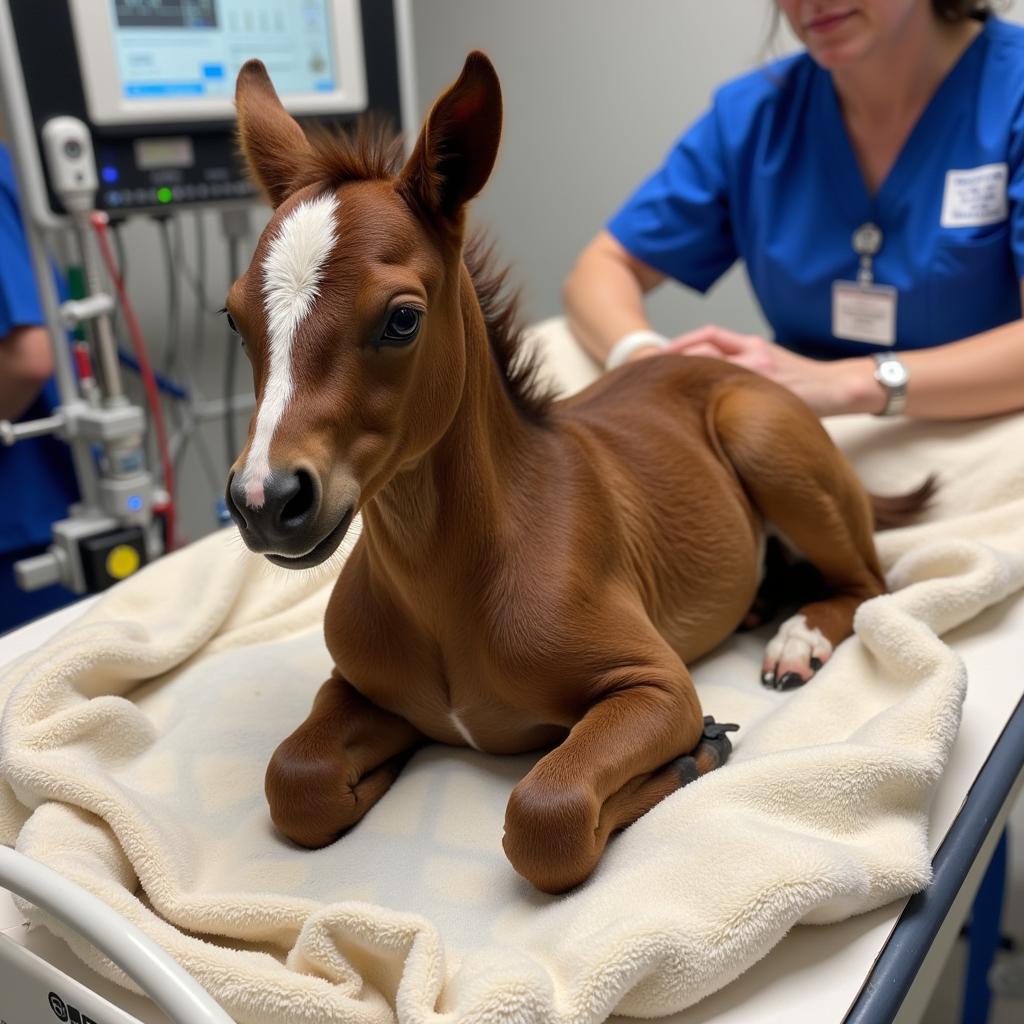A Premature Horse, often referred to as a premature foal, is a newborn born before the typical 320-345 day gestation period. While foals born a few days early may exhibit minor developmental delays, those born significantly prematurely often face a cascade of health challenges that require intensive care and a dedicated team of veterinary professionals. This article delves into the causes, signs, and care strategies for premature horses, shedding light on the delicate journey of these fragile newborns.
Recognizing the Premature Foal: Signs and Challenges
Identifying a premature foal involves observing physical characteristics and potential behavioral indicators. Premature foals often exhibit:
- Low Birth Weight: Typically weighing less than 9% of the mare’s body weight.
- Short, Silky Hair Coat: Their coat may appear finer and silkier than that of a full-term foal.
- Incomplete Ossification: The cartilage in their ears and joints may be soft and underdeveloped.
- Weakness and Lethargy: Premature foals may struggle to stand or nurse effectively.
- Difficulty Regulating Body Temperature: Their underdeveloped systems make it challenging to maintain a stable body temperature.
Navigating the Challenges: Common Health Concerns
Premature foals are susceptible to a range of health issues, including:
- Respiratory Distress Syndrome (RDS): Immature lung development can lead to difficulty breathing.
- Hypoglycemia: Low blood sugar is a common concern due to their limited energy reserves.
- Hypothermia: Maintaining a stable body temperature is crucial for their survival.
- Infections: Their immature immune systems make them highly vulnerable to infections.
 Premature Foal in Intensive Care
Premature Foal in Intensive Care
Providing Critical Care: A Lifeline for Premature Foals
The first few hours and days are critical for a premature foal’s survival. Immediate veterinary intervention is paramount, and treatment plans are tailored to each foal’s specific needs.
- Respiratory Support: Oxygen therapy or ventilation may be necessary to assist with breathing.
- Nutritional Support: Providing colostrum, the first milk rich in antibodies, is essential. Intravenous fluids and nutritional support may also be required.
- Temperature Regulation: Incubators or warming blankets help maintain a stable body temperature.
- Infection Control: Strict hygiene protocols and antibiotics are crucial to prevent and manage infections.
A Long Road Ahead: Prognosis and Long-Term Care
The prognosis for premature foals varies depending on the degree of prematurity and the presence of underlying health conditions. While some foals may experience long-term health challenges, others can thrive with appropriate care.
 Veterinarian Caring for Premature Foal
Veterinarian Caring for Premature Foal
A Testament to Resilience: The Journey of a Premature Horse
The arrival of a premature foal presents a unique set of challenges, demanding unwavering dedication from owners and veterinary professionals alike. With expert care, early intervention, and a commitment to their well-being, these fragile newborns can defy the odds and embark on a journey of growth and resilience.
Frequently Asked Questions about Premature Horses
What are the common causes of premature birth in horses?
Premature birth in horses can stem from various factors, including infections, placental abnormalities, and maternal health issues.
How long do premature foals need intensive care?
The duration of intensive care varies depending on the foal’s condition, but it can range from a few days to several weeks.
Can premature foals lead healthy lives?
With proper care and management, many premature foals can go on to lead healthy lives, although some may experience long-term health challenges.
What are some signs that a premature foal is thriving?
Positive signs include steady weight gain, active nursing, and normal vital signs.
Where can I find additional resources and support for caring for a premature foal?
Consult with your veterinarian and seek guidance from reputable equine organizations specializing in neonatal care. For further information on colostrum and its importance for foals, refer to our article on colostrum for horses.
Do you need assistance with your horse?
Contact us at Phone Number: 0772127271, Email: [email protected], or visit our address: QGM2+WX2, Vị Trung, Vị Thuỷ, Hậu Giang, Việt Nam. We have a 24/7 customer service team ready to assist you. You can also learn more about horse care by reading our other informative articles like this one about draft horse boots.